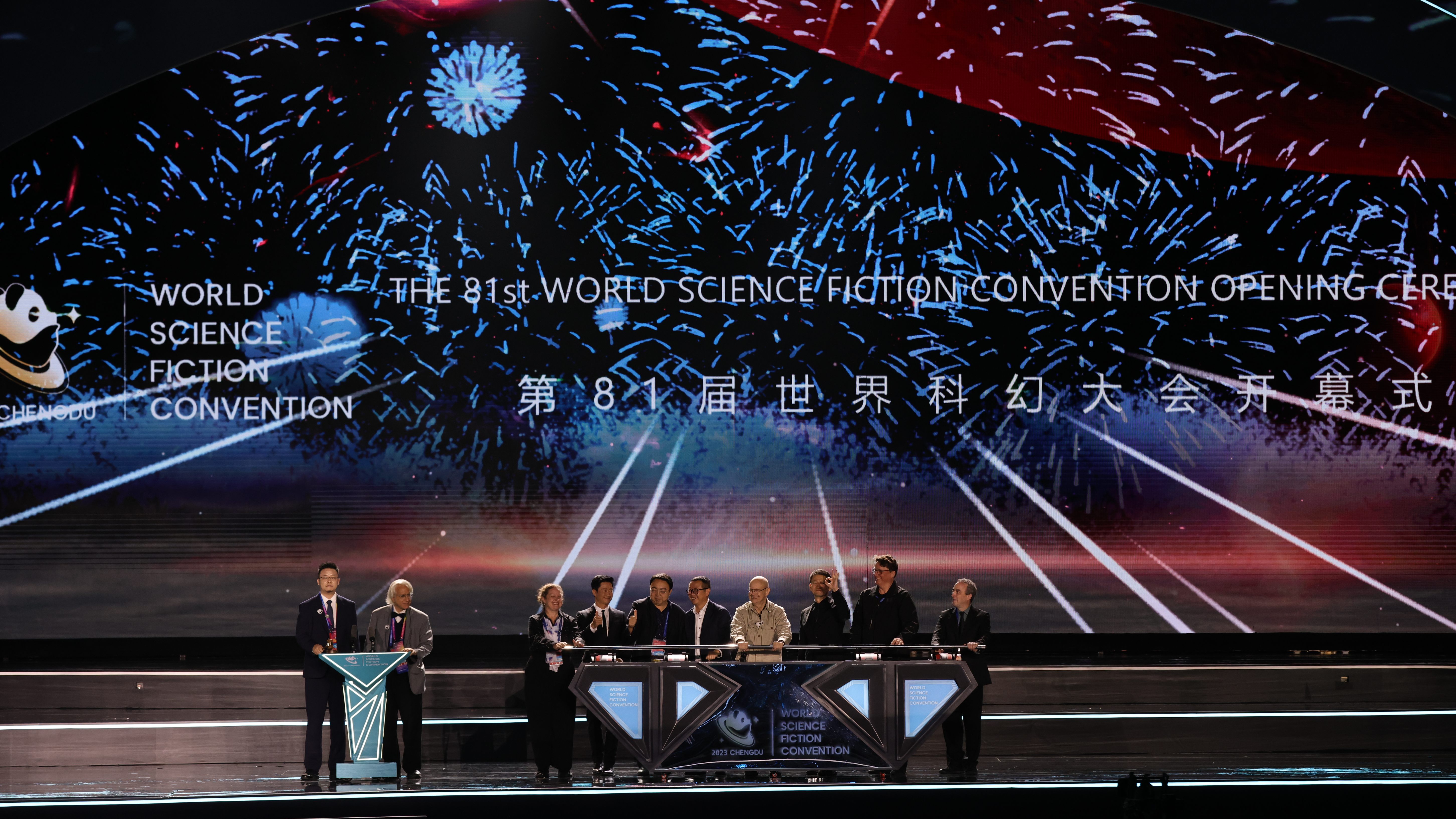
The opening ceremony of the 81st World Science Fiction Convention in Chengdu City, Sichuan Province, China, October 18, 2023. /CGTN
The opening ceremony of the 81st World Science Fiction Convention in Chengdu City, Sichuan Province, China, October 18, 2023. /CGTN
The 81st World Science Fiction Convention (WorldCon) opened on Wednesday night in the southwestern Chinese city of Chengdu, marking China's first time holding the world's largest and most influential science fiction carnival.
The five-day event, highlighting the symbiotic relationship between science fiction (sci-fi) and the city, includes the opening and closing ceremonies, the Hugo Awards, theme exhibitions occupying an area of 5,000 square meters and salons.
Science fiction enthusiasts from five continents gathered in China to discuss visions of the future and exchange views on the new trend of technology, focusing on the direction of humanity and even Earth's destiny in the universe.
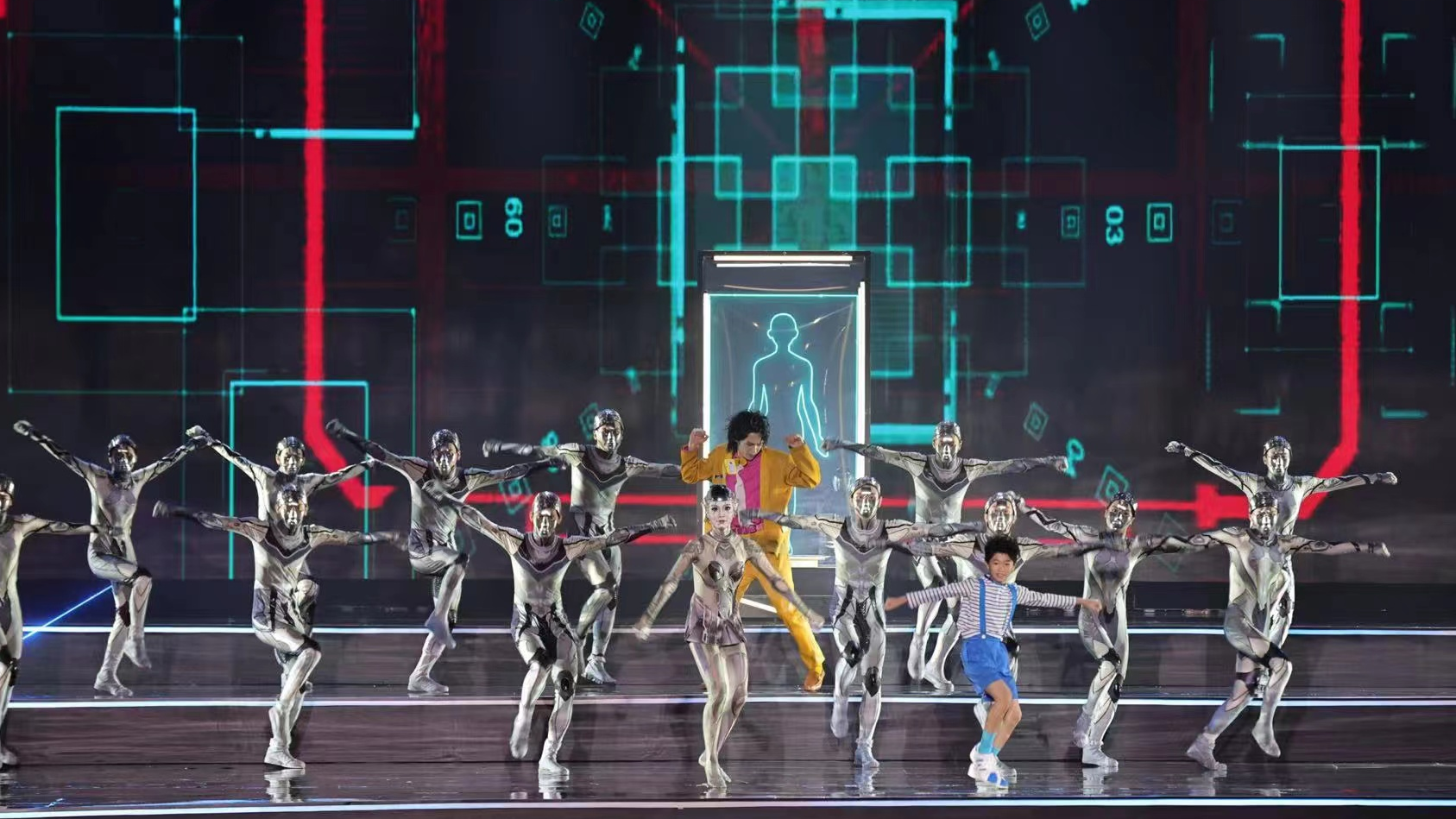
The performance at the opening ceremony of the 81st World Science Fiction Convention in Chengdu City, Sichuan Province, China, October 18, 2023. /CGTN
The performance at the opening ceremony of the 81st World Science Fiction Convention in Chengdu City, Sichuan Province, China, October 18, 2023. /CGTN
Guests of honor include Liu Cixin, Robert J. Sawyer and Sergey Lukianenko.
Liu is the most well-known science fiction writer in China. His novel "The Three-Body Problem" won the 73rd Hugo Award for Best Novel, which is the first time that an Asian writer has won this award.
Sawyer, called "the dean of Canadian science fiction" by The Ottawa Citizen, won 66 awards for his fiction, including the Hugo, Nebula, and John W. Campbell awards for best novel (for "Hominids," "The Terminal Experiment" and "Mindscan"), and he has 12 additional Hugo nominations to his credit.
Lukianenko is one of the most famous Russian science fiction and fantasy writers. His accolades include Best Writer of the 2003 European Science Fiction Convention and Best Writer of the 2006 Russian Science Fiction Convention.
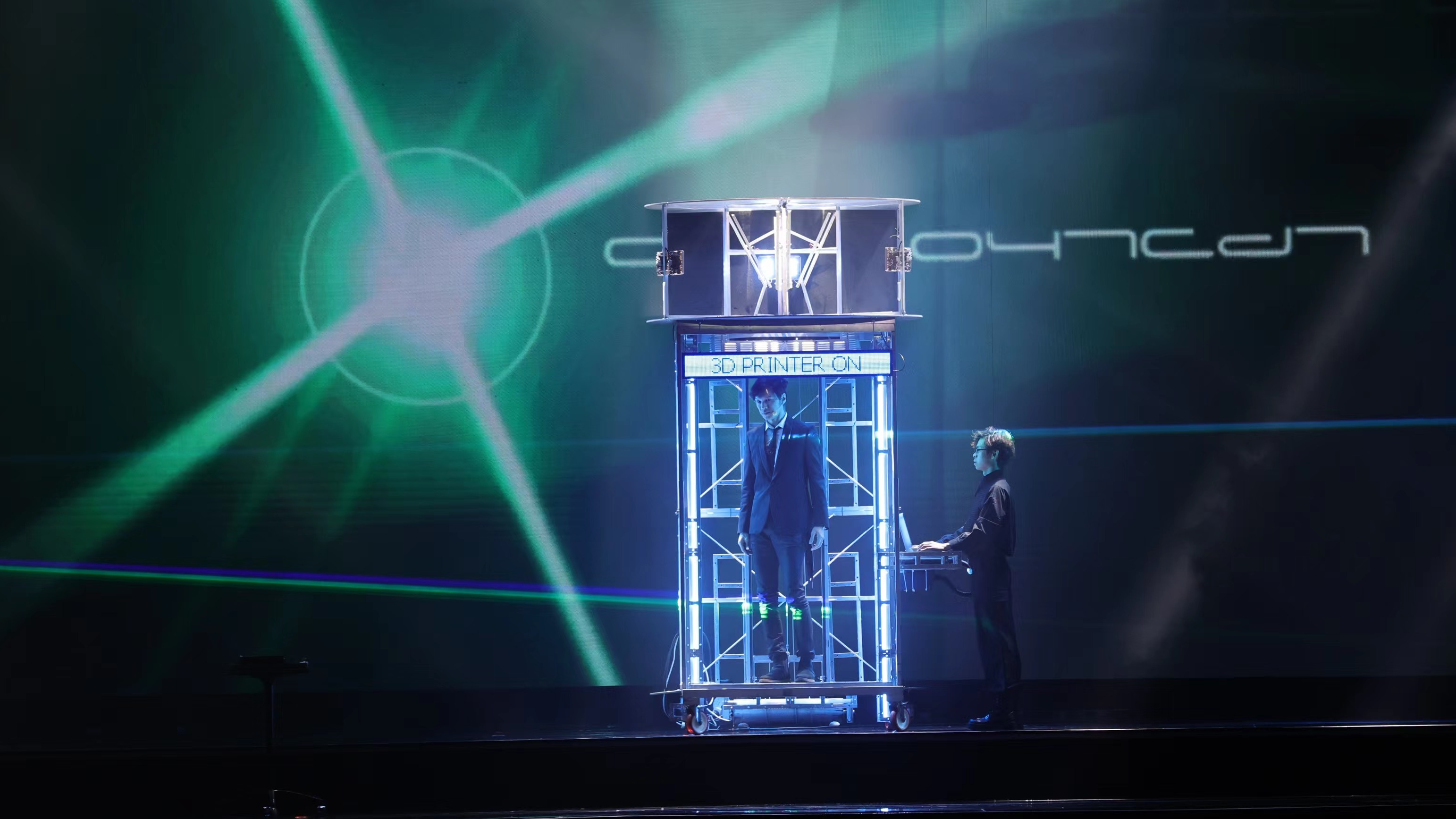
The performance at the opening ceremony of the 81st World Science Fiction Convention in Chengdu City, Sichuan Province, China, October 18, 2023. /CGTN
The performance at the opening ceremony of the 81st World Science Fiction Convention in Chengdu City, Sichuan Province, China, October 18, 2023. /CGTN
Science fiction art
The science fiction art known as "Prophecy for Tomorrow" is particularly eye-catching at this time, and the theme of this year's science fiction convention is "Symbiosis Era."
Modern science fiction was born in the United Kingdom in 1818 and is seen as a product of the sci-tech revolution and the industrial revolution.
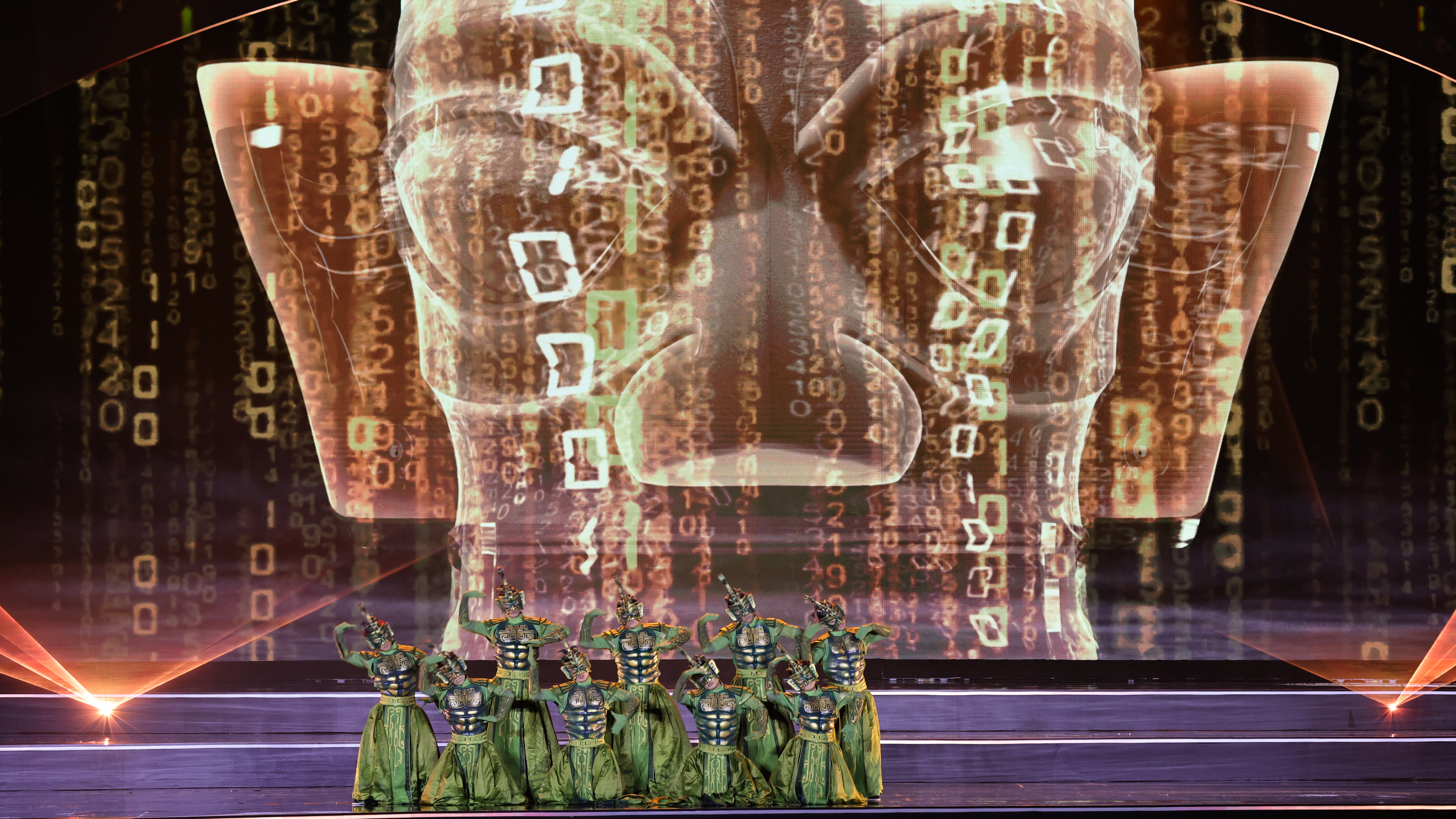
The performance at the opening ceremony of the 81st World Science Fiction Convention in Chengdu City, Sichuan Province, China, October 18, 2023. /CGTN
The performance at the opening ceremony of the 81st World Science Fiction Convention in Chengdu City, Sichuan Province, China, October 18, 2023. /CGTN
This young genre of literature and art was introduced to China by Lu Xun, a renowned Chinese writer, and others in the early 20th century.
It focuses on science and fantasy, considers the changes of the times brought about by sci-tech progress and explores the future possibilities of mankind and the world.
In 1939, the first WorldCon was held in New York, reflecting that in the 20th century, when the theories of relativity and quantum mechanics emerged, human evolution entered a new stage, ushering in endless possibilities and great challenges.

An illuminated balloon of mascot Kormo is set up at the venue of the 81st World Science Fiction Convention in Chengdu City, Sichuan Province, China. /CGTN
An illuminated balloon of mascot Kormo is set up at the venue of the 81st World Science Fiction Convention in Chengdu City, Sichuan Province, China. /CGTN
Why Chengdu?
Chengdu is the second Asian city hosting this convention, with more than 80 years of history, after Japan's Yokohama.
The 65th World Science Fiction Conference in Japan's Yokohama in 2007 saw only a four-member delegation from China.
This year, thousands of Chinese science fiction writers and fans are gathering in Chengdu, sharing with the world their knowledge of new technology and their visions of a new world.
The decision to hold the 81st WorldCon in Chengdu was made at the 79th WorldCon in Washington, D.C., in 2021.
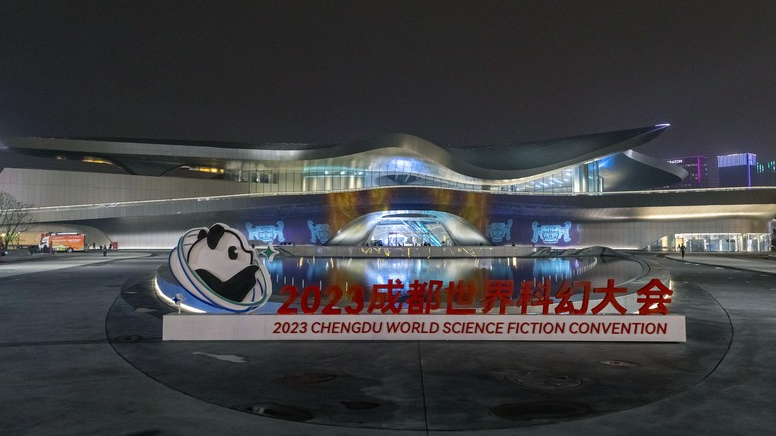
A night view of the Chengdu Science Museum, main venue for the 81st World Science Fiction Convention, in Chengdu City, southwest China's Sichuan Province, October 16, 2023. /Xinhua
A night view of the Chengdu Science Museum, main venue for the 81st World Science Fiction Convention, in Chengdu City, southwest China's Sichuan Province, October 16, 2023. /Xinhua
Chengdu, as a bidding city, won the hosting competition after voting by sci-fi fans from around the world. The success is related to the vigorous development of Chinese science fiction.
Chengdu is home to "Science Fiction World," a magazine with the largest circulation of all science fiction publications globally, and is an important base of China's scientific innovation.

The 81st World Science Fiction Convention (WorldCon) opened in Chengdu City, southwest China's Sichuan Province, October 18, 2023. /CGTN
The 81st World Science Fiction Convention (WorldCon) opened in Chengdu City, southwest China's Sichuan Province, October 18, 2023. /CGTN
In addition, the output value of China's science fiction industry, including publications, films and others, reached 87.75 billion yuan (about $12.2 billion) in 2022.
The country has produced a series of science fiction films, such as "The Wandering Earth," that earned billions of yuan at the box office.
China also has the world's largest number of science fiction aficionados.
In this context, science fiction has become more prosperous, bringing the prospect of tomorrow's world and the popularization of scientific knowledge into millions of households.
This year's conference also incorporates cultural symbols of Chengdu, such as the Sanxingdui Ruins and giant pandas.
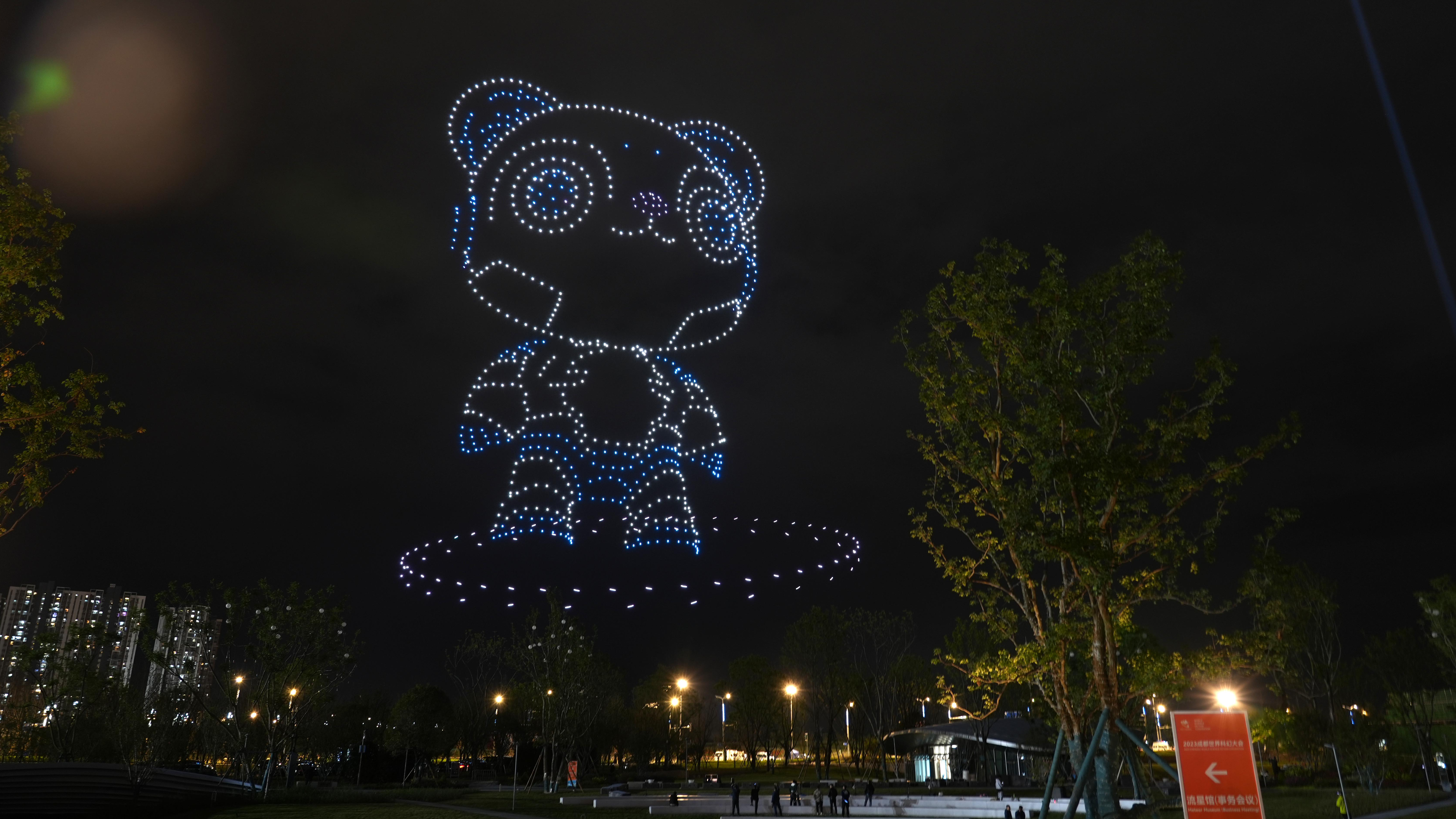
The mascot Kormo is formed in the air by drones with lights in Chengdu, Sichuan Province, China. /CGTN
The mascot Kormo is formed in the air by drones with lights in Chengdu, Sichuan Province, China. /CGTN